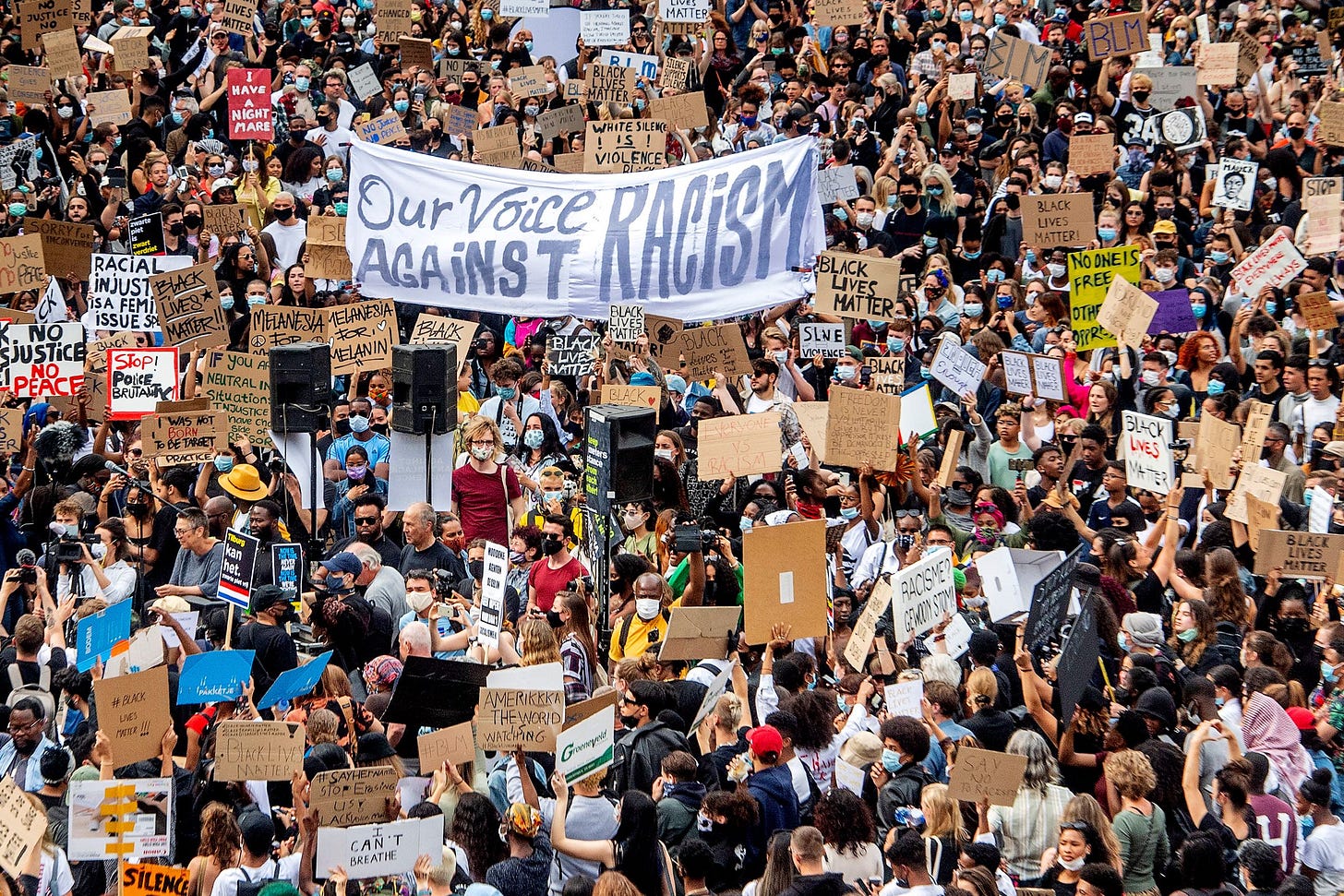An American Holiday
It’s December. You walk into the mall, holidays of giving gifts are on display. Streamers and balloons and tinsel line the ceilings and shop windows. You see sales - 20 percent, 30 percent, and 40 percent off! Things feel cozy and warm, the smell of the food court drifts up through your nostrils. But to your children, chicken fingers and pepperoni pizza is the last thing on their mind. They want to look at all the new toys they’ve heard about via advertisements, word of mouth, or even their favorite online content creator they’ve pledged their allegiance to with donations from your credit card. What’s more, they could go sit on the great gift-givers lap and tell him exactly what they want.
You make your way to the center of the fluorescently intoxicating mall and finally come across the man at the center of it all. But this isn’t Santa Claus you see. Instead, it’s a man with a top hat, goatee and three piece suit. Sure, his hair is white, but the suit isn’t crimson red with white fur accents. It’s a sequin textured suit with the colors of red, white, and blue. Still, the children are eager to sit on Uncle Sam’s lap and tell him precisely what they want.
But what do they want? More directly, what would you want?
The wants of Americans have been bastardized over the last century. Cheapened, like the impact of manufacturing moving overseas. Just as the gifts have become, dreams for our society have grown more and more trivial. Better roads, cheaper healthcare, and more money.
It’s clear, the various and often conflicting hopes and dreams for Western society. It’s easy to see the current polarization and delineate the left and the right from one other. Jake Tapper is proudly planted at CNN and Jesse Waters has an even stronger grip in the Fox media-sphere, aside from the fact that Fox dominates the cable news landscape over CNN. Still, these are the mouthpieces for our politics at this current time. They’ve earned an amount of trust from society. This trust can come from genuine intellectual agreement, or simply the fact that they can be seen as an authority figure by virtue of being on your TV telling you what’s happening. This gets into the fundamental question of this writeup: how do we identify what we want from our government?
Crafting Your Wishlist
It isn’t hard to look around and figure out what could be better in American society. It’s a lot tougher to trust our government to actually make these things happen, when for so long they’ve seemed to be deaf to such issues. Putting that aside, what comes to mind about your life, your town or your values and how they’re reflected more broadly?
For me, it seems that what Americans want most is money itself. This isn’t a new concept, but it becomes more dire year over year. 60 percent of Americans live paycheck to paycheck, and this isn’t due to any lacking work ethic or laziness. This is seen from people working multiple jobs, grueling overtime, and the instances of rapid inflation in recent years. Job growth and income has not proportionately kept up with the cost of food and goods. The majority of Americans who voted for Trump cited “the economy” in being their top issue, and it’s not a secret why. It feels like each election in my lifetime has essentially been a referendum on which candidate will somehow put more money in the pockets of citizens. People are working hard and wondering why they can’t lead the lives they’ve dreamed of - lives their ancestors or relatives had been able to lead in the near-past even. So, even though this is an issue that impacts the constituents of both US political parties, how come there hasn’t been any meaningful change?
There’s a multitude of reasons, but the largest is distraction. If people care more about the border, relations with China, or transgender rights, they’re too preoccupied to then point a finger and rightly identify why they’re struggling financially. This isn’t to say that these “distractive” issues are invalid, the problem is that it’s quite the opposite. Politicians (as they say in sports) flood the zone, that way there are a stack of valid struggles to tend to alongside virtually universal ones, like income inequality and healthcare. Thus, culture wars ignite on the basis of these more focused issues, and people on either side of the aisle and centrists can hardly move past these issues before getting to the things that deeply and presently impact everyone.
This is why it’s important to identify the things you want outside of the media sphere. I’d posit that a reason for some of our hyper-polarization today is also the speed and prevalence of information we ingest on an hour by hour basis. We have pundits telling us what it means when x bill is introduced or when y court decision is made. This sort of thing can be avoided by doing focused deep-dives on the issues you care about, and following the news for updates on those issues more specifically. It serves to be informed, sure, but not when you’re simply taking someones word for it.
It’s not fun to continuously think about politics (trust me, I know). But we as Americans have been lulled into a dangerous sleep, and as we sleep we have many whispering in our ears dreams of exceptionalism. How “America is the greatest country in the world.” This is a fairy tale, and was potentially truest in a time where people were more involved anyway. I’m sorry to say, but if you have problems with the country, and you don’t see things changing over years, it’s time to buck up and get involved.
If you are curious in our country’s problems, and passionate about finding ways to fix them, just cut out the noise. If you’re not a reader, I’d urge you to give it another shot, though regardless there are hundreds of well-sourced informative video essays on YouTube that can walk you through these issues for free. The key to true “free-thinking” is the idea that like a child who no longer is being spoon-fed, you control what information you ingest, and by extension what you think of such information.
Have You Been Good This Year?
When I was a kid, still believing in Santa, I received coal one year. It was earth-shattering. For years, and for most kids, actually receiving coal was not top of mind. Something that just felt like more of a scare-tactic for misbehaving a bit. I’ll defend myself in saying that though I could have had some tantrums or something, I wasn’t a bad kid. I didn’t bully anyone or defy my parents beyond fair reasoning. Still, my mom drove to the public park, found a charcoal grill, and took a single piece of coal about the size of a quarter home. She put it in a little jewelry box atop the soft cotton padding, then closed it up with a ribbon wrapped around. It was put in my stocking, which we always opened first. Though I did receive regular gifts that year, the gift-wrapped coal landed as a feared reminder to be in best behavior. Soon after, I stopped believing in Santa.
This “gift” of coal is how I see a lot of the concessions our legislators offer. It’s wrapped, but it misses the mark in being a functional gift. The stimulus during COVID was helpful for a month, but after that it was gone. A real gift would be a way for Americans to keep more money in their pockets consistently, not just a band-aid solution. At its worst, coal could be used for a fire, to keep warm. But unless it’s a bucket of coal by the day for the cold months, even that won’t do much good either. The things we ask for in this democracy are not meant to be IOUs for a better tomorrow. We need to cash in today. The ways we do that are by knowing what we want, and demanding it. Across the pond, the French flood the streets when the age of retirement inches up. Why do we comparatively sit idly by when politicians who claim to want to help us with money pass a bill that mostly provides a tax break to the very wealthy?
This is another example of a coal-like gift - Trump’s “One Big Beautiful bill Act” that recently passed the House. It adds trillions to the country’s deficit (something Republicans continuously claim to be better at managing despite deepening it each time they’re in power), and barely provides tax breaks to the overwhelming majority of Americans. The trick in politics is if you don’t identify exactly who you’re helping, it sounds like everyone is being helped. This is why Trump’s tax breaks are so popular with the rich and comparatively poor, not to mention the legitimately poor. In verbiage, it sounds like everyone will save money with this plan. That may be the case, unless you make less than $15k a year, in which case you’re punished and owe even more than in the past to the government. The connection to coal here, in case you missed it, is the idea that mere hundreds of dollars in tax savings is going to make any meaningful change to individuals or families lives. It’s gift-wrapped, it’s not negative, but it’s pacifying the desire for change at most. It says “look, we changed this, for you!” But there’s no change apart from the pennies you’re being tossed in this process.
Santa Isn’t Real…So Go to the Store
I put myself through a sort of bootcamp in the year preceding the 2024 election. Though I’ve been interested in history since childhood, my college years and early foray into full-time employment distracted me a bit. I still went through important changes, finding my voice in opposition to racial violence and liberties for gender-identity and sexuality. Sure, not a surprising evolution for a guy with a B.A. in Digital Media.
Still, something lurked beneath the surface. I could tell there was depth to the system we live in, but I couldn’t tell how far or in which direction this went. At times the political landscape can feel like peering to the bottom of a pool, the textured designs refracted by the light hitting the surface, continuously shifting and preventing you from judging what’s what aside from a painted measurement on the side.
Podcasts, radio shows, independent journalism, live coverage, etcetera. I dove deep and worked to identify what I believe, but also what others believe. As I paid more and more attention to the headlines and the values buried in them, I began to become more conscious of how little power I have in our republic. The worlds richest man was able to casually give the amount of money it’d take to buy two F-35 fighter jets to Donald Trump. If I’d even want to donate, I’d be able to spare the cost of a deli sandwich. A mediocre one.
I can articulate what I want from this country. I know that I’m in the minority of Americans in terms of my attention and contemplation regarding politics. This itself isn’t an indicator of a failing nation either, to be sure. After all, not everyone was in the Continental Congress. Still, it’s important to talk about politics even when its unpleasant. Newsflash: that’s part of politics, unpleasantries. Institutions of governance are there for us to make our society better and progress from problems, not find ways to allow some problems and hand out first-aid kits to those who get maimed in the process. As many can relate to right now, I’m not a fan of America. But the difference between someone like myself and a true adversary is I believe it can be improved for all. I’m not sure what’s more patriotic than that idea: standing up for your beliefs and calling out an oppressive government.
With all of this said, I don’t expect everyone to be an expert on everything, let alone politics. But being told why we should care about certain things rather than others is a very real intrusion on our freedom, something we say we hold dear in the USA. My positions for what I want in this country is tied to what would be best for all, though I’ll grant the unfortunate hurdles that many people would have to jump to get to this mindset. At the root of it all, it’s important to identify what hardships you yourself are facing. Prices are too high? The town isn’t fixing the roads quickly enough? Did your business close because of the competition with that new Wal-Mart that moved in next door? This is what democracy is: identifying problems you see in your personal life and/or society, and utilizing your voice via where you put your money and vote is the power we have. If you’re more concerned with other issues that don’t directly impact you, you might as well send your mother’s maiden name to that sketchy email address asking for it - it’s a scam that could likely harm you.
There is no Uncle Sam at the mall who’s lap you can sit on. The closest things we have are voting, boycotting, and protesting. If you’re not into those things, then get cozy, because things would never change in your favor. When the rich are in charge, they’ll make decisions for the rich first, and everyone else secondarily. That is, of course, as long as what everyone else wants doesn’t harm the rich in the process. After all, who would dream of limiting someone to just three houses when they’re such a valuable asset.







